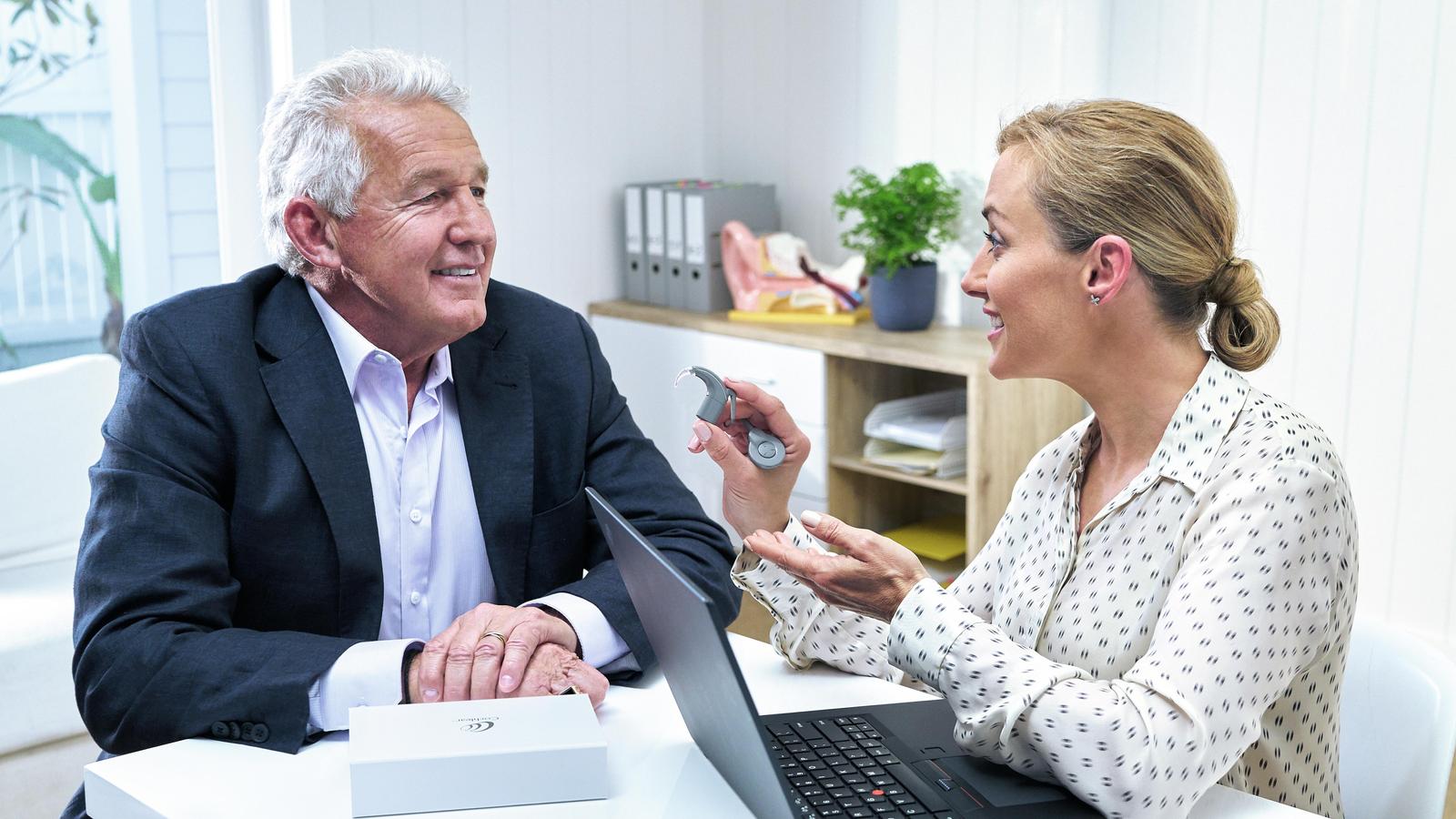
Welcome to your quick reference guide to CI referral
If you refer patients for cochlear implants, this page provides background and resources to help you support them confidently.
What you'll find on this page
- Background and benefits of Cochlear Implants
- NICE Guidance – Criteria reminder
- How Cochlear Implants work
- Conversation starters with your patient
- Your referral checklist / process
- Resources
Background
Fewer than 1 in 20 adults who could benefit from a CI have one. The British Cochlear Implant Group’s (BCIG) CIRCA study of more than 6,000 patients showed only 36% of potentially suitable patients were told of their eligibility, and of those, only 9% were referred for an assessment.1
Benefits of cochlear implants
- Improved hearing of speech and everyday sounds2 in both quiet and noisy environments
- Designed to make sounds clearer3,4 for people with severe to profound hearing loss
- Unmatched reliability 5
- Support active lifestyles
- No age limit6
- Backed by over 40 years of research and innovation
- Connect to apps for simple streaming and convenient for remote care
NICE criteria reminder

How Cochlear Implants work
- Sound is picked up by microphones on the sound processor.
- A digital signal is sent via the coil located just under the skin and through to the implant.
- The implant converts the signals and sends them to the cochlear via the electrode array.
- The brain receives the signals and perceives them as sound.
Conversation starters with your patients
When speech testing is not available, obtaining subjective feedback from your patients about how they are getting on with their hearing aids can be really valuable.
Ask your patients
- Are your hearing aids no longer providing adequate benefit?
- Do you struggle to hear in noisy environments?
- Have you found yourself drawing away from gatherings because you know it will be difficult to hear and join the conversation?
- Do you find hearing telephone conversations challenging?
If your hearing aids are no longer enhancing your hearing/day-to-day lifestyle, you may be eligible to be referred for a Cochlear Implant (CI) assessment. Remember, a referral is simply the next step for a discussion on hearing implants, with no commitment to surgery at this stage.
Referral process
Cochlear Compass
Navigating the cochlear implant journey
It’s natural for patients referred for an assessment to be hesitant. Our team in Cochlear Compass can help. They can take questions and offer your patient time to discuss the process wherever they are on their journey and if appropriate, connect them with one of our volunteers who can share their honest, lived experience. Not only is this beneficial for your patient, but the service provided by our team (at no cost) can help save you time in your appointment. Your patients can contact Cochlear Compass on HearNow@Cochlear.com. Find out more on this below.
Resources to support your patients
Our patient information videos are counselling resources for patients who are taking their first steps towards a cochlear implant.
The video is available as an e-book which can be held at your clinic and used with your patients to support the conversation when you introduce implatation as an option. Contact our Engagement Team to request your e-book at UKLearnNow@cochlear.com.
The team can also give you packs of postcards that include a link to the video for you to pass to your patients to take away. They can revisit the video with their friends and family to help their understanding of the process.

A thought provoking poster to show in your patient waiting area providing common scenarios that a patient may be able to relate with to prompt a conversation around hearing implants.
Request your copy of our waiting room poster for CI at UKLearnNow@cochlear.com.
Our A3 blotter pads provide visual references for you to use with your patient in clinic. They include an audiogram to assist with the level of hearing a patient has, an explanation of cochlear implants, together with features and benefits should the patient want to know more. Contact the Engagement Team for your copy UKLearnNow@cochlear.com.
In 2024, we hosted a focus group for CI Champions and CI Mentors in the London region. A standardised regional referral form was discussed at length, and we are pleased to be able to share a link to this for use in other areas.
Navigating the cochlear implant journey
Cochlear Compass, established in 2018, supports patients at every stage of their cochlear implant journey—from referral and assessment to surgery and switch-on. Our team provides personalised information, and patients can connect with DBS-checked volunteers who are implant recipients, offering first-hand experiences and reassurance.
Cochlear Compass also provides professional assistance around candidacy referral education, customised clinic-level support and service improvement, and product information.
This service costs nothing to you or your patient.
For professionals, contact UKLearnNow@cochlear.com.
For your patients, contact HearNow@cochlear.com.
We have created an introduction video to audits and the CI Referral Report. You can access this here. This video explains the how and why of effective auditing, and lists simple steps to stay aligned with IQIPS standards. If you’re using AuditBase, the CI Referral Report also makes reviewing your patient list quicker and easier.
New resource coming soon
Disclaimer
This material is intended for health professionals. If you are a consumer, please seek advice from your health professional about treatments for hearing loss. Outcomes may vary, and your health professional will advise you about the factors which could affect your outcome. Always read the instructions for use. Not all products are available in all countries. Please contact your local Cochlear representative for product information.
For a full list of Cochlear’s trademarks, please visit our Terms of Use page.
*1 Views expressed are those of the individual. Consult your health professional to determine if you are a candidate for Cochlear technology.
References
- Cochlear Implant Referral Criteria Audit (CIRCA) of 6000 patients.
- Granço FS, Fernandes NF, Morettin M, Costa Filho OA, Bevilacqua MC. The relationship between the speech perception and the degree of satisfaction among adult users of cochlear implants. International archives of otorhinolaryngology. 2013 Apr;17(02):202-7.
- Fitzpatrick EM, Leblanc S. Exploring the factors influencing discontinued hearing aid use in patients with unilateral cochlear implants. Trends in Amplification. 2010,14;(4):199–210.
- Runge CL, Henion K, Tarima S, Beiter A, Zwolan TA. Clinical outcomes of the Cochlear™ Nucleus® 5 cochlear implant system and SmartSound™ 2 signal processing. J Am Acad Audiol. 2016,27;(6):425–440.
- Cochlear Limited. D2182827. Cochlear Nucleus System Reliability Report, Volume 22 December 2023. 2024, April. Available to download from ww.cochlear.com/compatibility.
- IFU details – Approved for babies over 7KG.






